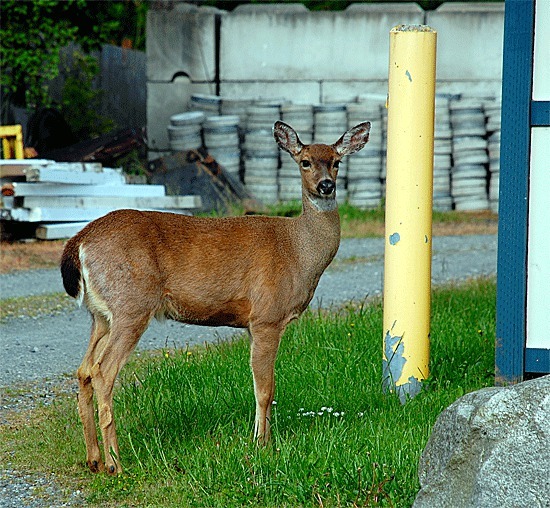Whidbey Island’s deer are suffering from a type of baldness that can kill.
A lice-related disorder called “deer hair loss syndrome” has struck the island’s native black-tail deer. It causes the animals to become extremely itchy and to groom excessively, essentially licking or chewing their own fur off.
But Ruth Milner, a wildlife biologist for the state department of Fish and Wildlife, said the poorly-understood syndrome can cause more than just miserable and unsightly deer. It can be fatal, especially to fawns.
“It’s not pretty when you see an animal really affected by it,” she said. “It’s difficult to see them suffer, but on a population level, it’s not a significant problem. Whidbey Island has a very robust deer population.”
Milner said the syndrome, which is apparently triggered by an exotic louse, first showed up in Western Washington about 15 years ago and made its way to Whidbey about five to eight years ago.
After the deer become infested with the lice, they tend to develop hypersensitivity or a severe allergy, which leads to itchiness, excessive grooming and hair loss.
But for reasons not clearly understood, Milner explained, many of the afflicted animals develop secondary infections, such as diarrhea and pneumonia. The infections can be fatal to deer. Symptoms include yellow or white fur or bare patches. Later, balding deer may appear emaciated and lethargic.
“Infestations are heaviest during late winter and early spring, and many affected deer, especially fawns, die during this time,” the Fish and Wildlife website states.
Neither the syndrome nor the lice affect people or animals besides deer. The lice have been found on elk, but apparently don’t cause an allergic reaction. The lice originated from European deer.
Milner said deer hair loss syndrome tends to show up in certain areas of the island and then “lets up” for awhile, possibly because the deer develop a resistance. This spring there’s been reports of the syndrome showing up on deer on South Whidbey, especially in the Putney Woods area.
Unlike white-tails, black-tail deer don’t run in herds. They are territorial animals and have ranges of a half mile to a mile in diameter, Milner said.
According to Milner, a type of wormer medication has successfully treated captured deer, but there’s really no way to treat wild deer on a large scale, especially since they don’t like the taste of the medicine. She suggested landowners could try putting out salt blocks treated with the wormer, if they could get their hands on some.
“My best advice is just to let nature take its course,” she said.
The Oregon Department of Fish and Wildlife — which has been dealing with the syndrome longer than Washington — advises residents to humanely euthanize deer that are obviously suffering from the syndrome. But that’s not an option in Washington state, where it would be illegal for civilians to shoot a deer this time of year, even if it’s suffering.
“It’s called hunting out of season,” Milner said.



